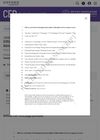 May 2023 in “Frontiers in Immunology”
May 2023 in “Frontiers in Immunology” Treg cell-based therapies might help treat hair loss from alopecia areata, but more research is needed to confirm safety and effectiveness.
 December 2022 in “Dermatology and Therapy”
December 2022 in “Dermatology and Therapy” Alopecia areata needs more recognition and better treatment access in Latin America to improve patient care and outcomes.
 January 2017 in “Journal of Investigative Dermatology Symposium Proceedings”
January 2017 in “Journal of Investigative Dermatology Symposium Proceedings” The 2015 Hair Research Congress concluded that stem cells, maraviroc, and simvastatin could potentially treat Alopecia Areata, topical minoxidil, finasteride, and steroids could treat Frontal Fibrosing Alopecia, and PTGDR2 antagonists could also treat alopecia. They also found that low-level light therapy could help with hair loss, a robotic device could assist in hair extraction, and nutrition could aid hair growth. They suggested that Alopecia Areata is an inflammatory disorder, not a single disease, indicating a need for personalized treatments.
February 2025 in “PubMed” CS12192 effectively treats alopecia areata with better safety than current options.
 December 2023 in “Journal of Ayub Medical College Abbottabad”
December 2023 in “Journal of Ayub Medical College Abbottabad” Ritlecitinib effectively treats alopecia areata in patients 12 and older with fewer side effects.
 1 citations,
April 2018 in “Journal of Investigative Dermatology”
1 citations,
April 2018 in “Journal of Investigative Dermatology” Fzd2 is important for skin and hair development through various signaling ways.
 26 citations,
October 2016 in “Biomolecules & Therapeutics”
26 citations,
October 2016 in “Biomolecules & Therapeutics” 3-Deoxysappanchalcone helps human hair cells grow and stimulates hair growth in mice by affecting certain cell signaling pathways.
 4 citations,
April 2018 in “Journal of Investigative Dermatology”
4 citations,
April 2018 in “Journal of Investigative Dermatology” Hydroxypinacolone retinoate is a potent anti-aging ingredient for skin that is more effective and less irritating than other forms of retinoids.
 2 citations,
February 2014 in “Hair therapy & transplantation”
2 citations,
February 2014 in “Hair therapy & transplantation” Alopecia Areata is an autoimmune condition causing hair loss, influenced by genetics, environment, and possibly improved by anti-MIF therapy, with many patients experiencing regrowth within a year.
 April 2018 in “Journal of Investigative Dermatology”
April 2018 in “Journal of Investigative Dermatology” Older hair follicle stem cells have a reduced ability to renew themselves, leading to more hair loss.
 April 2018 in “Journal of Investigative Dermatology”
April 2018 in “Journal of Investigative Dermatology” Both Th1 and Th2 immune responses are increased in alopecia areata, with Th2 response more strongly linked to how severe the disease is.
 April 2018 in “Journal of Investigative Dermatology”
April 2018 in “Journal of Investigative Dermatology” Activating Nrf2 helps wounds heal faster by increasing hair follicle stem cells.
 April 2018 in “Journal of Investigative Dermatology”
April 2018 in “Journal of Investigative Dermatology” Topical tofacitinib is effective in promoting hair growth for non-scarring alopecia.
 1 citations,
January 2023 in “SAGE open medical case reports”
1 citations,
January 2023 in “SAGE open medical case reports” A new treatment called deucravacitinib helped a patient with severe hair loss grow their hair back quickly.
 3 citations,
February 2021 in “Evidence-based Complementary and Alternative Medicine”
3 citations,
February 2021 in “Evidence-based Complementary and Alternative Medicine” The Chinese herbal supplement BeauTop can potentially boost hair growth and thickness by increasing a protein called Vascular Endothelial Growth Factor.
 December 2024 in “Clinical and Experimental Dermatology”
December 2024 in “Clinical and Experimental Dermatology” Switching to ritlecitinib improves hair regrowth and well-being in severe alopecia areata patients.
 April 2024 in “Bioactive materials”
April 2024 in “Bioactive materials” New microneedle treatment with growth factors and a hair loss drug shows better and faster hair growth results than current treatments.
 1 citations,
January 2023 in “Cutis”
1 citations,
January 2023 in “Cutis” The paper concludes that the new medication baricitinib needs further testing in a more diverse group of patients with alopecia areata.
 August 2024 in “JAMA Dermatology”
August 2024 in “JAMA Dermatology” Continuous baricitinib is needed to keep hair regrowth in severe alopecia areata.
 June 2024 in “JEADV Clinical Practice”
June 2024 in “JEADV Clinical Practice” Severe alopecia areata patients have a low chance of spontaneous hair regrowth.
 September 2014 in “SciBX”
September 2014 in “SciBX” JAK inhibitors may help treat alopecia areata and promote hair regrowth.
26 citations,
October 2016 in “American journal of clinical dermatology” New treatments like JAK inhibitors show promise for reversing alopecia areata.
 3 citations,
January 2015 in “Nasza Dermatologia Online”
3 citations,
January 2015 in “Nasza Dermatologia Online” Some treatments for autoimmune hair loss work, but JAK inhibitors like tofacitinib are promising for regrowth.

Alopecia Areata has no cure, treatments are limited, and the condition often recurs, but new therapies like JAK inhibitors show promise.
 May 2024 in “Journal of cosmetic dermatology”
May 2024 in “Journal of cosmetic dermatology” Tofacitinib is an effective and safe treatment for alopecia areata.
46 citations,
October 2018 in “JCI insight” CD8+ T cells are involved in alopecia areata and may cause disease relapse.
 47 citations,
December 2019 in “Frontiers in immunology”
47 citations,
December 2019 in “Frontiers in immunology” A new mutation in the STING protein causes a range of symptoms and its severity may be affected by other genetic variations; treatment with a specific inhibitor showed improvement in one patient.
11 citations,
February 2022 in “JAAD case reports” Abrocitinib, a JAK inhibitor, may help treat atopic dermatitis and alopecia universalis together.
 2 citations,
April 2018 in “Journal of Investigative Dermatology”
2 citations,
April 2018 in “Journal of Investigative Dermatology” Frontal fibrosing alopecia shows increased inflammation and JAK-STAT pathway activity without reduced hair proteins.
 60 citations,
September 2013 in “Alimentary Pharmacology & Therapeutics”
60 citations,
September 2013 in “Alimentary Pharmacology & Therapeutics” Immunosuppressive and anti-TNF therapies in IBD patients can increase the risk of skin cancer and cause various skin issues.


























